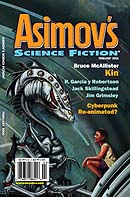

Letters
Review welcomes letters from readers and will print them as space permits. Letters may be edited for brevity and clarity. Unsigned letters cannot be used, but names of the writers may be withheld on request. Send letters to Rochester Review, 147 Wallis Hall, P.O. Box 270033, University of Rochester, Rochester, NY 14627-0033; rochrev @rochester.edu.
“I was profoundly moved and immensely proud of the many efforts by the University’s departments and individuals to reach out to the victims of this unimaginable disaster.” —John Denison ’64, ’69W (MA)
Thanks, Rochester!
As a Rochester graduate and a resident of Washington Parish, one of the Louisiana parishes directly in Katrina’s devastating path, I was profoundly moved and immensely proud of the many efforts by the University’s departments and individuals to reach out to the victims of this unimaginable disaster.
The assistance given to affected Rochester students and students from Louisiana colleges, as well as the fund drives, prayer meetings, teach-ins, and general support from the entire University community, is truly moving.
I can assure you that all victims of Katrina’s rage, those who know and
those who are unaware of the University’s efforts on their behalf, are
eternally grateful for the University’s generosity and compassion.
Thank you.
John Denison ’64, ’69W (MA)
Franklinton, Louisiana
For more on the University’s response to the devastation caused by Hurricane Katrina, see page 10—Editor.
Why Wallis Hall?
It was with shock and dismay that I read in a timeline of the tenure of the presidency of Thomas H. Jackson (Summer 2005) that the Administration Building has been renamed in honor of the late Chancellor W. Allen Wallis.
I really have to wonder whether the great minds that arrived at this decision had a collective bout of amnesia. Perhaps they weren’t around in the late 1960s when President Wallis basically treated students and faculty members as second-class citizens.
Was it their intention to rewrite history, especially concerning the most heated controversies of this period: the dispute over the discipline of 23 graduate students who sat-in against Dow Chemical’s on-campus recruitment drive, the debate over the University’s affiliation with the Center for Naval Analysis, and the controversy over the appointment of history professor Eugene D. Genovese?
Rather than rehashing these issues, suffice it to say that, in style and substance, Wallis’s actions during this period showed utter disdain for the role of the Faculty Senate. As noted in the excellent article by Craig Linder ’00 on the “Crisis of Confidence (1966–69),” many esteemed faculty members were embittered by what they regarded as an “authoritarian, anti-intellectual” atmosphere fostered by Wallis. I personally recall several from the history department who simply up and left.
The true Wallis legacy is one of scorn for anyone not sharing his corporate, elitist view of society. That being said, does he really deserve such an honor?
Mel Hyman ’71
Montclair, New Jersey
Editor’s note: As reported in 1998, the Administration Building was renamed in Wallis’s honor shortly after the former president’s death. At the time, Jackson noted Wallis’s contributions to Rochester: “Allen Wallis’s legacy at the University is permanent and extraordinarily positive. He was a man of absolute integrity and perseverance, who had a clear academic vision and an insistence on the highest academic standards. Not only was he instrumental in the transformation of the University to a national institution of the first rank, but his continuing mark on this institution is clear today, as many of our strongest schools and programs can be directly traced back to leadership that Allen was instrumental in bringing to Rochester.” Linder’s essay, which won first place in a University Libraries–sponsored competition in 2000, is available online.
FROM OUR CONTRIBUTORSA Science Story
 The
February issue of Isaac Asimov’s Science Fiction will include a
short story, “Under the Graying Sea,” by Jonathan Sherwood
’04 (MA), a senior science writer in the Office of University Public Relations
and a frequent contributor to Rochester Review.
The
February issue of Isaac Asimov’s Science Fiction will include a
short story, “Under the Graying Sea,” by Jonathan Sherwood
’04 (MA), a senior science writer in the Office of University Public Relations
and a frequent contributor to Rochester Review.
Correction
Our apologies to Kelly Clark ’85, ’86W (MS), the associate director for alumni relations and multicultural services in the Office of College Advancement, whose graduate degree we misidentified in the fall issue; and to Mara Sapon-Shevin ’72, ’76W (EdD), a professor of teaching and leadership at Syracuse University, whose name we misspelled in quoting her in Alumni Gazette. She made her comments to Time magazine, not Newsweek.
